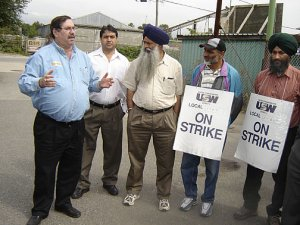Hot Summer: Thousands Strike in Western Canada

What do you get when you mix almost 8,000 striking forestry workers and 5,300 striking municipal workers with a scattering of strikes throughout British Columbia (B.C.) and Alberta? You get a hot summer in Western Canada with 15,000 workers walking picket lines in one province alone.
In Alberta, construction unions across the province are gearing up for possible strike action at the end of August involving 30,000 members. The strike is expected to affect every major construction project in the province. Meanwhile, 400 paramedics in Calgary are fuming because the province declared a state of public emergency in order to stop them from striking.
CORPORATE CAMPAIGN
Steelworkers (USW) President Leo Gerard flew in from Pittsburgh to support the striking forestry workers in Port Alberni, on Vancouver Island. He promised that the union will target customers and shippers around the globe. “We need to win this battle by bringing this industry to its senses—not its knees,” said Gerard.
The workers have been on strike since July 21. The dispute between the union and Forest Industrial Relations, an association representing 31 companies, is over a combination of shift scheduling, overtime, and severance pay.
On July 26 the British Columbia Federation of Labor issued a “hot” declaration on all coastal lumber, logs, and wood products originating from unionized logging and sawmilling operations where the Steelworker members are on strike. This was in response to claims that struck timber companies were trying to ship logs to non-union operations.
Since the USW’s predecessor union, the Industrial, Wood, and Allied Workers Union, was formed in 1937, there have been only seven strikes affecting the B.C. coastal membership, according to USW Wood Council Chairperson Bob Matters.
STONEWALLING
While striking forest workers are preparing for a long fight, municipal workers in Vancouver are trying to get the city to bargain. Talks broke off on August 9.
The unions, Canadian Union of Public Employees Locals 1004, 391, and 15, reported no progress at the bargaining table. Local 15 President Paul Foaro said, “Last time we met with this employer, they spent two hours and 22 minutes out of two days actually meeting with us. This time, it’s worse. Out of a possible six days, we spent four hours and 13 minutes with the employer.”

SUPPORT LABOR NOTES
BECOME A MONTHLY DONOR
Give $10 a month or more and get our "Fight the Boss, Build the Union" T-shirt.
The city claimed the union walked away.
Since the strike, residential garbage pickups have been suspended, municipal services at city hall reduced, and 22 library branches have been closed.
A key issue for the strikers is pay equity for women workers. For the last decade CUPE B.C. has campaigned for greater pay equity for women. According to the union’s website, “Although the gender pay gap has decreased significantly over the last 50 years, since 1992 it has remained relatively constant.” Municipal workers in nearby Burnaby made pay equity gains in their recently ratified contract. Other neighboring municipal locals recently settled for five-year contracts with 17.5 percent wage increases.
CATCHING UP
Geoff Meggs, executive director of the British Columbia Federation of Labour, explained that while these are high profile strikes, strike activity in B.C. is still very low compared to just 10 years ago. “This could be seen as getting closer to normal,” he said.
Meggs pointed to a few general factors that have sparked the strikes: an anti-labor government and drastic changes to labor law that affect unions negatively.
Back in Alberta, while 15 of the province’s 25 construction trades have accepted an industry template agreement giving them a four-year deal with wage increases of 23-24 percent, five unions, representing boilermakers, plumbers and pipefitters, electricians, millwrights, and refrigeration mechanics, have taken strike votes. Two more unions, representing carpenters and laborers, are also poised to take strike votes in mid-August.
Calgary paramedics, fighting for higher wages, gave the city 72 hours notice of a strike on July 23. They were immediately banned from striking by the Alberta government and their dispute went to binding arbitration.
The strike ban has sparked a sticky public debate over whether emergency workers should be declared an essential service, thus stripping them permanently of the right to strike.
“All the ingredients are in place for a year or more of challenging labor relations,” Alberta Federation of Labour President Gil McGowan recently told the bi-weekly news publication Business Edge. “Today, it’s the paramedics and the construction workers. Soon, it could be the teachers and members of the Alberta government civil service.”




